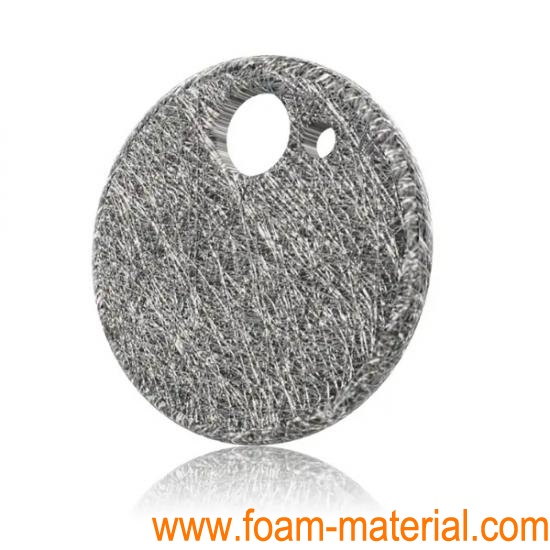Nickel-Made Filter: A Comprehensive Guide
A nickel-made filter is a filtration device constructed from nickel or nickel alloys. These filters are widely used in industries where high-temperature, corrosive, or harsh environments are common due to the exceptional properties of nickel, such as excellent corrosion resistance, high strength, and durability. Below is an in-depth exploration of nickel-made filters, including their design, applications, advantages, limitations, and future prospects.
---
●1. What Is a Nickel-Made Filter?
A nickel-made filter is a filtration medium fabricated from nickel or nickel-based alloys. It can take various forms, such as:
- Perforated sheets: With uniform holes for filtering large particles.
- Wire meshes: Woven grids for fine filtration.
- Sintered structures: Porous materials formed by sintering nickel powder for advanced filtration.
Nickel-made filters are designed to separate solids, liquids, or gases while withstanding extreme conditions like high temperatures, pressures, and corrosive media.
---
●2. Composition of Nickel-Made Filters
A. Base Material
- Nickel (Ni): Provides core properties like corrosion resistance, thermal stability, and mechanical strength.
B. Alloying Elements
- Small amounts of other metals may be added to enhance specific properties:
- Chromium: Improves oxidation resistance.
- Iron: Increases tensile strength.
- Copper: Enhances electrical conductivity.
- Molybdenum: Boosts resistance to pitting and crevice corrosion.
---
●3. Properties of Nickel-Made Filters
| Property | Description |
|-------------------------------|-----------------------------------------------------------|
| Corrosion Resistance | Excellent in acidic, alkaline, and saline environments. |
| High-Temperature Stability| Maintains strength and integrity at elevated temperatures. |
| Mechanical Strength | Resistant to deformation under pressure or stress. |
| Porosity | Adjustable pore size for different filtration needs. |
| Durability | Long service life in demanding industrial conditions. |
---
●4. Manufacturing Process
The production of nickel-made filters involves several specialized techniques:
A. Perforation
- Sheets of nickel are punched with precise holes to create a perforated filter.
- Suitable for coarse filtration.
B. Wire Meshing
- Nickel wires are woven into a mesh structure to form a fine filter.
- Ideal for applications requiring high surface area and fine particle separation.
C. Sintering
- Nickel powder is compacted and heated to form a porous structure without melting.
- Produces robust filters with controlled porosity for advanced filtration.
D. Electroforming
- Nickel is deposited onto a mandrel using electroplating techniques to create intricate filter designs.
- Suitable for producing thin, high-precision filters.
---
●5. Applications of Nickel-Made Filters
A. Chemical Industry
- Used in processes involving aggressive chemicals, such as acids, alkalis, and solvents.
- Examples include filtration of hydrochloric acid, sulfuric acid, and caustic solutions.
B. Oil and Gas
- Employed in high-pressure and high-temperature environments for separating solid particles from oil, gas, or water streams.
- Commonly used in downhole filtration and pipeline systems.
C. Aerospace
- Utilized in fuel systems, hydraulic systems, and environmental control systems due to their ability to withstand extreme conditions.
D. Medical Devices
- Used in biomedical applications, such as blood filtration and dialysis systems, thanks to their biocompatibility and sterility.
E. Nuclear Industry
- Filters radioactive particles and contaminants from cooling water and other fluids.
- Resistant to radiation and corrosion in nuclear environments.
F. Food and Beverage
- Used for filtering beverages, oils, and food products where hygiene and chemical resistance are critical.
Nickel Fiber Sintered Felt
●6. Advantages of Nickel-Made Filters
| Advantage | Description |
|-------------------------------|-----------------------------------------------------------|
| Corrosion Resistance | Performs well in harsh chemical environments. |
| High-Temperature Stability| Suitable for applications exceeding 600°C. |
| Mechanical Strength | Resists deformation under pressure or stress. |
| Precision Filtration | Available in various pore sizes for tailored filtration. |
| Long Service Life | Durable and resistant to wear, extending operational life.|
---
●7. Limitations of Nickel-Made Filters
| Limitation | Description |
|-------------------------------|-----------------------------------------------------------|
| Cost | Nickel is relatively expensive compared to other metals. |
| Weight | Heavier than lighter materials like aluminum or titanium. |
| Complex Fabrication | Requires specialized techniques for certain designs. |
| Environmental Concerns | Nickel dust and waste may pose health risks if not handled properly. |
---
●8. Key Manufacturers and Research Institutions
| Organization | Focus Areas |
|------------------------------|---------------------------------------------------------|
| Honeywell International | Advanced filtration systems for aerospace and industry. |
| Pall Corporation | Specialty filters for medical, pharmaceutical, and industrial use. |
| Fraunhofer Institute | Research on functional materials and filtration technologies. |
---
●9. Future Trends in Nickel-Made Filters
1. Advanced Materials:
- Development of nanostructured filters for improved filtration efficiency and reduced clogging.
2. Hybrid Structures:
- Integration of nickel with other materials (e.g., ceramics or polymers) for enhanced performance.
3. Sustainability:
- Focus on recyclable and environmentally friendly production methods.
4. Customization:
- Use of additive manufacturing to create tailored filter designs for specific applications.
---
●10. Conclusion
Nickel-made filters are indispensable in industries that require reliable filtration solutions in extreme conditions. Their combination of corrosion resistance, high-temperature stability, and mechanical strength makes them ideal for chemical processing, oil and gas, aerospace, and nuclear applications. While challenges remain in terms of cost and fabrication complexity, ongoing research continues to enhance their performance and broaden their applicability.
If you're considering nickel-made filters for your project, carefully evaluate factors such as material selection, pore size, and operating conditions to ensure optimal results.
For further details or assistance in designing or implementing nickel-made filters, feel free to ask!
